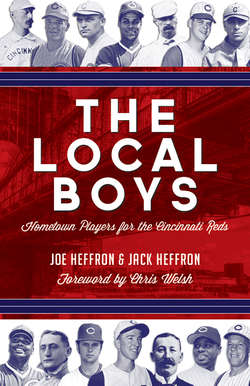Читать книгу The Local Boys - Joe Heffron - Страница 17
На сайте Литреса книга снята с продажи.
MIKE BELL
ОглавлениеDECEMBER 7, 1974–
Major League Career
2000
Time as a Red
2000
Position
THIRD BASE
IN THE ON-DECK CIRCLE AT COORS FIELD, Mike Bell felt a flutter of nerves—anticipation, anxiety, excitement. Pinch-hitting for Reds starter Pete Harnish in the ninth inning against the Rockies, after seven seasons in the minors and a lifetime of dreaming about this moment, he would bat for the first time in the big leagues. And with that at-bat he would make Major League history. Never before had three generations from one family played for one franchise. Grandfather Gus starred for the Reds in the 1950s, father Buddy in the 1980s. Only four families ever put three generations in the majors.
As if the moment needed another dramatic element, his dad, the Rockies’ manager, watched from the opposing dugout. Then, suddenly, Bell was called back. With a 9–2 lead, Harnish decided to bat for himself and pitch the bottom of the ninth. Bell says Harnish apologized afterward, having not realized the situation. The historic first at-bat happened a few days later in Houston.
Bell grew up in Indian Hill and Blue Ash while his dad played for the Indians, Rangers, and Reds. He calls his baseball pedigree “a blessing and a curse,” explaining, “when you grow up with it, you figure you’re going to play there as well.”
He followed his brother David (who played 12 seasons in the majors) to Moeller High School, helping win a state title in 1993 and earning first team All-City selections as a junior and senior. When the Rangers drafted him with the 30th overall pick, he launched his pro career, slashing .317/.395/.465 in rookie ball. By 22, he made AAA, but after that season, the Rangers traded him to the Angels, who three weeks later lost him in the 1997 expansion draft to the Diamondbacks, who within months traded him to the Mets. The rash of changes added a new level of anxiety, Bell says, which led to “the yips”—a mental block that prevented him from throwing naturally and accurately.
“It was a symptom of what I was going through,” he says. “I let the game get the best of me.” The issue had arisen before, he says. “It was something I’d dealt with since I was a kid. I was a careful kid and always tried to do the right thing.” He recalls that after the trades, “I tried to be perfect and it really intensified. To the point where I decided to quit.” But when he told the Mets his decision, they suggested he return to extended spring training and connected him with a sports psychologist. “That helped me put things together again,” Bell says. Grateful for the team’s patience, he says he has no regrets about the disorder, which he believes made him a more understanding, compassionate person.
He renewed his climb to the majors by signing with the Reds as a free agent in 2000, spending the first half at AAA Louisville. During the All-Star break, he and his wife, Kelly, visited family and friends in Cincinnati, and during the drive back to Louisville, Reds farm director Billy Doran called, telling him to meet the team in Colorado. He was now a Red.
Used mostly as a pinch hitter, Bell got into 19 games but started just four, hitting .222. When the season ended, he signed with Colorado to play for his dad, who sent him to AAA. He was called up for a second chance in the majors in September 2001 when Jeff Cirillo was injured, but Major Leaque Baseball shut down for a week following the World Trade Center attack, and when play resumed, so did Cirillo. Bell says, “Given what was happening in the world, not going to the big leagues was the least of my concerns.”
He retired in 2005 and worked in banking for a year before getting back into baseball. He is now director of player development for the Diamondbacks. As for his brief time as a Red, he recalls fondly the home run he hit on September 27 at Milwaukee’s County Stadium. After the ball sailed over the left-field fence, Bell circled the bases, knowing that his grandfather and his father had also homered in the old ballpark. He says, “That was pretty special.”
